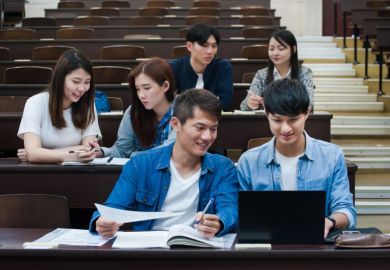Universities are developing new courses, and adapting existing ones, to teach students about the pandemic in real time.
Academics who have created programmes related to Covid-19 highlighted how they were designed to be educational in both the practical and academic sense as well as helping students to psychologically process the crisis.
Krista Milich, an assistant professor of biological anthropology at Washington University in St Louis, developed an intensive three-week online course titled The Pandemic: Science and Society, which ran from mid-August, ahead of the start of the academic year. Classes took place for two hours each weekday and the programme was open to all students at the institution.
It showcased the expertise of academics across the university and at other institutions, with guest lecturers covering topics including empathy, employment law, the pandemic’s impact on the arts, and leadership and management in a public health crisis.
Dr Milich told Times Higher Education that the dean of the College of Arts & Sciences had asked her to create an interdisciplinary pandemic-related programme after the institution announced that it would be teaching classes in person this semester.
“They wanted students to be prepared before they came back to campus,” she said. “I came up with The Pandemic: Science and Society with the goal to show not only some of the biological information about Sars-CoV-2 itself, but also how it’s impacting people in the US and beyond.”
Dr Milich said some students had been concerned about being subjected to peer pressure or feeling isolated when the new academic year started, but the course helped create a culture of encouraging safe behaviour on campus.
The programme included a public communication assignment, in which students had to share what they had learned with their social networks, through means such as flyers, social media posts or articles, meaning that the lessons reached the wider campus community.
More than 1,300 students signed up to the two-credit course, 1,251 completed it and all the lectures have since been made publicly available, Dr Milich added.
“It’s by far the largest course we’ve ever had at the university,” she said, adding that she will be teaching a follow-up course next semester titled The Second Wave of the Pandemic: Science and Society, which will draw on the latest research on Covid-19.
“Pandemics are going to be more and more common, so I think that classes like this, unfortunately, are going to become part of our reality longer term.”
Mike Limarzi, senior professorial lecturer of mathematics and statistics at the American University in Washington DC, also pivoted his teaching towards Covid-19. When classes moved online in the spring, he redesigned the second half of his first-year maths course so students could apply their learning to real life.
He taught students how pandemic models work, why the spread of the virus will not be exponential in the long run and about some of the problems with the way in which Covid-19 data was presented by the media.
“We wanted to help them understand the situation in a more logical, rational way, so they maybe wouldn’t be as nervous [about the pandemic],” he said, adding that linking the course to Covid-19 also helped make the class more engaging.
The course is running again this semester and Dr Limarzi said he planned to keep the Covid-19 elements in future years.
Across the border, Katherine Lyon, an assistant professor of teaching in the department of sociology at the University of British Columbia, developed a course titled Covid-19 and Society: Inequality in Global Pandemics, which was open to undergraduates across arts, science and business. It was taught during the summer and is being taught again this semester, and a free public version is now available on the online learning platform edX. Dr Lyon has also applied for a broader version of the programme, referencing historical pandemics as well as Covid-19, to become a permanent course.
The three-credit programme explores topics such as ageism, racism, health inequalities and the opioid crisis, and the link between Covid-19 and climate change.
“I was concerned about media representations of Covid presenting it as a risk for each individual person to deal with and I wanted to situate it in a collective and collaborative lens and a global lens. I wanted to help students process the pandemic in real time,” Dr Lyon said.
“Some students found it to be quite transformative: one student, after taking the module on racism and the pandemic, said that they had never studied racism in an academic setting before and that it gave them a way to name their own experience of being discriminated against for wearing a mask.”
POSTSCRIPT:
Print headline: Academics put impact of pandemic on curriculum
Register to continue
Why register?
- Registration is free and only takes a moment
- Once registered, you can read 3 articles a month
- Sign up for our newsletter
Subscribe
Or subscribe for unlimited access to:
- Unlimited access to news, views, insights & reviews
- Digital editions
- Digital access to THE’s university and college rankings analysis
Already registered or a current subscriber?








